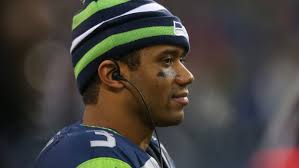RUSSELL WILSON
Your handwriting is as unique as your fingerprints. No two are alike. Ever. You were born a natural graphologist. Can you tell what Russell Wilson’s writing say about him? Let’s see what you think and I’ll give you some extra insights too….
Is it clear and easy to read? You bet it is! He chooses to print instead of use cursive in this short, but dark, bold handwritten sample.
He uses a “Greek E” for the letter E. (A backward looking number 3) This and other traits in this sample (rounded W instead of a W with angles, points and wedges) reveal a softer side of a rough and rugged NFL football player. He is more than muscle…………..the “Green E” represents a writer who takes significant interest in culture, art and refinement. In cursive writing, when the Greek E is disconnected from the other letters in a sentence, it reveals these passionate areas of interest in culture and refinement were self-learned/self-taught. The fact that it shows up 100% of the time in this short sample, shows an intense interest that is woven intricately into his lifestyle.
Is football considered cultural? See what Wikapedia has to say about it at the bottom of this post.
His slant is primarily a vertical slant: He is head oriented, logical. Objective. Cool Hand Luke, baby!
However………..take a closer look at the word “GO“. Do you see how the sudden strong forward right slant reveals his intense desire to go go go Go!!! Does he feel emotional about this action verb? You bet he does. He put his heart into it in that very moment and let his feelings rule over his head. (Right slanted writing reveals a far more emotionally expressive nature).
Being that I live in Colorado, of course I am a Bronco fan and am a big Peyton Manning Fan, in fact the next post will be about Manning. But let’s give credit where credit is due. Congratulations Seahawk’s. You were definitely yesterday’s big winner.
Kathi McKnight
Your “Write” Coach
For more secret tips and to see Kathi’s interview on the Dr. Oz show, visit www.TheHandwritingExpert.com
Wikapedia: “Football culture refers to the cultural aspects surrounding the game of association football. In many countries, football has ingrained itself into the national culture, and parts of life may revolve around it. Many countries have daily football newspapers, as well as football magazines. Football players, especially in the top levels of the game, have become role models for people. The game has become glamorized, with many children practicing the game and aspiring to the wealth shown off by the top footballers. Football’s power runs deeper than the ninety minutes played on the pitch, it has held the power to unify nations, it has played out wars and it has brought people together from around the world. The FIFA World Cup held every four years is the quintessential football event, combining the greatest players in the world and the passion of the fans. Football has a long and glorious history, with which a vast and diverse culture has emerged. The culture of football can be easily divided into how the players, fans and clubs see the sport.”


